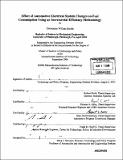Effect of automotive electrical system changes on fuel consumption using incremental efficiency methodology
Author(s)
Hardin, Christopher William
DownloadFull printable version (4.322Mb)
Other Contributors
Massachusetts Institute of Technology. Technology and Policy Program.
Advisor
Richard Roth, Thomas A. Keim, Gary DesGroseilliers and Frank R. Field, III.
Terms of use
Metadata
Show full item recordAbstract
There has been a continuous increase in automotive electric power usage. Future projections show no sign of it decreasing. Therefore, the automotive industry has a need to either improve the current 12 Volt automotive electrical system or move to a higher voltage vehicle electric system. Both of these choices are likely to increase cost of the system. Performance improvements will be needed to justify the increased cost to the Original Equipment Manufacturer. This thesis is investigating the potential for fuel economy improvements and their associated economic advantages for different vehicle electric systems. The objective is to determine the effects on fuel consumption of electrical system choices under a variety of drive and load cycle circumstances. Incremental, or marginal, efficiencies will be used to determine the relationship between loads and fuel consumptions. ADVISOR, a model developed by the National Renewable Energy Lab, has been adapted for use in this application. This included the implementation of industry standard engine performance map and alternator efficiency map data in the ADVISOR model.
Description
Thesis (S.M.)--Massachusetts Institute of Technology, Engineering Systems Division, Technology and Policy Program, 2004. Includes bibliographical references (p. 76-77).
Date issued
2004Department
Massachusetts Institute of Technology. Engineering Systems Division; Technology and Policy ProgramPublisher
Massachusetts Institute of Technology
Keywords
Technology and Policy Program.